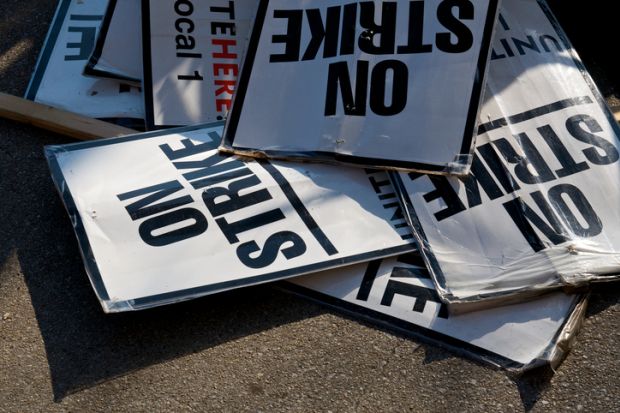University lecturers could be joined by catering staff, cleaners and security guards in taking strike action over pay this autumn after a second UK higher education union announced a ballot of its members.
Unison has joined the University and College Union in rejecting a proposed 3 per cent pay rise for most staff, tabled by the University and Colleges Employers Association in May.
A vote on whether to begin industrial action over the rise opened on 22 July, and will run until 19 August in Scotland and 26 August in England, Northern Ireland and Wales.
Unison – which represents 20,000 non-academic staff at 93 UK universities – said more than four in five of its members turned down the increase because it would do little to help with the crushing cost-of-living pressures staff face.
During negotiations, unions had asked for a pay rise of 2 per cent above the Retail Price Index, which would have amounted to a double digit wage hike given this rate of inflation is currently 11.8 per cent.
Despite recognising the cost-of-living pressures on university staff, employers did not increase their final offer – which includes a 9 per cent rise for the lowest paid – at the end of the formal negotiations on 14 July. Ucea has said that it will proceed with administering the pay rise from the beginning of August despite the lack of agreement with the unions.
UCU has already announced plans to hold an aggregated ballot of its members later in the summer, meaning all branches of the union could take action if turnout exceeds 50 per cent nationwide.
“University staff have endured years of wage stagnation. With prices going through the roof and inflation at an all-time high, a 3 per cent pay offer is a significant pay cut,” Unison's head of education Mike Short said when announcing his union’s ballot.
He added that “staff can’t afford to feed their kids, pay for housing or fill up their petrol tanks” and are “desperate” for a wage increase that reflects the work they do. He warned that unless employers invest in staff, they may leave the sector for “better paid, less stressful” jobs in other areas.
Raj Jethwa, chief executive of Ucea, pointed out that a significant proportion of Unison’s members will be among those receiving the highest wage rises because they tend to be at the lowest points of the pay spine.
“In making the final offer for 2022-23, Ucea exhausted its mandate and has implemented an uplift that will already be financially challenging for many of our members. The 13.8% pay claim is simply unaffordable and undeliverable, and this much higher uplift would have put thousands of jobs at risk unnecessarily,” he added.
Register to continue
Why register?
- Registration is free and only takes a moment
- Once registered, you can read 3 articles a month
- Sign up for our newsletter
Subscribe
Or subscribe for unlimited access to:
- Unlimited access to news, views, insights & reviews
- Digital editions
- Digital access to THE’s university and college rankings analysis
Already registered or a current subscriber?








